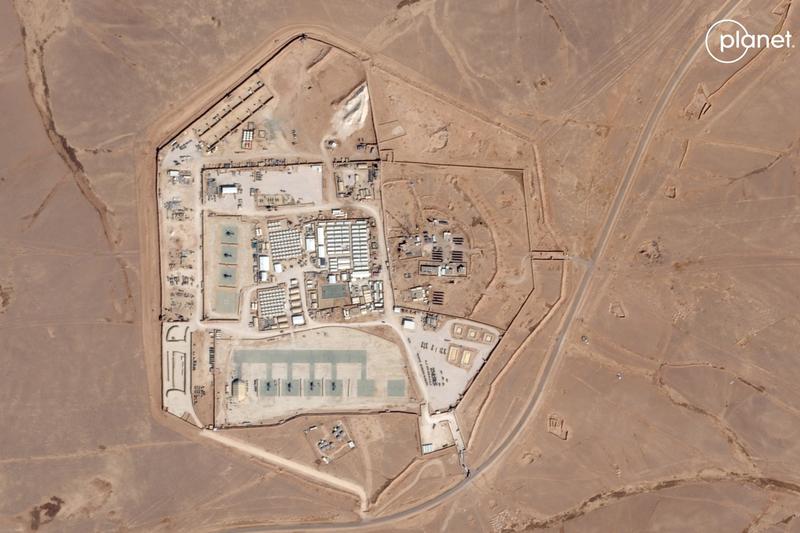
After a drone strike killed three American soldiers in northeastern Jordan near the Syrian-Iraqi border on Sunday, the United States blamed “radical militant groups backed by Iran” operating in Syria and Iraq, AFP reported.
Associated with the former pro-Iranian paramilitary group Hashd al-Shaabi, the groups play a key political role in Iraq, cultivating a rhetoric that emphasizes their hostility to the United States and their commitment to what Iran calls an “axis of resistance” against Israel. and Washington.
The US has promised tough retaliation for the attack in Jordan. Iran denies any involvement.
- On the same subject: “I don’t think we need a wider war in the Middle East.” Biden announced that he had decided on a response to the drone attack on US troops in Jordan
Nebula of armed groups
The attack in Jordan shares the same modus operandi as missile attacks and drone strikes launched since mid-October against US and international coalition soldiers fighting the Islamic State (IS) jihadist group in Iraq and Syria.
Illustrating the explosive regional context, these attacks – 165 in total – are the result of the war in Gaza between Israel and the Palestinian Hamas, which has been ongoing since 7 October.
Most of them have been claimed by the Islamic Resistance in Iraq, a group of militants from pro-Iranian groups who say they are acting in solidarity with the Palestinians and are demanding the withdrawal of the 2,500 US troops deployed as part of the coalition.
In response, Washington targeted the Hezbollah Brigades and al-Nujaba, two groups it says are involved in the Resistance, including the Sayed al-Shuhada Brigades.
Classified as “terrorists” by Washington, the groups claim to be part of an “axis of resistance” along with Lebanon’s Hezbollah, Yemen’s Houthi rebels and Hamas.
According to the Syrian Observatory for Human Rights, they also have fighters participating in the conflict in Syria on their behalf, in support of the regime.
On Tuesday night, Hezbollah’s brigades announced that they were “suspending” their military operations against American forces after threats of retaliation by the United States “to avoid any problems for the Iraqi government.”

American base Tower 22 in Jordan, where a drone attack took place that killed three soldiers Photo: AFP / AFP / Profimedia
What is their origin?
These groups are officially affiliated with Hashd al-Shaabi – Popular Mobilization – a coalition of former paramilitary groups formed in June 2014 to support Iraqi forces against the Islamic State.
It was created in response to a fatwa issued by Ayatollah Ali al-Sistani, Iraq’s top Shiite religious authority, calling for “jihad” against the Islamic State. In 2016, by order of the Prime Minister, a law was adopted on the integration of the Hashdu into the regular forces.
Hashd contributed to Iraq’s defeat of IS in 2017, backed by an anti-jihadist coalition led by Washington.
It drew its strength from Shiite armed groups that fought against American forces after the 2003 invasion.
During the war against the Islamic State, the new armed groups were created and trained by Iranian General Qassem Soleimani, a high-ranking commander of the Iranian Revolutionary Guard Corps, who was killed in a US strike in Baghdad in January 2020.
Hashd currently consists of dozens of groups and approximately 160,000+ members. Neither the government nor the organization discloses the number of participants.
Over the years, several leaders have emerged. In particular, Abu Mehdi al-Muhandis, a former dissident who previously found refuge in Iran and who was the Iraqi lieutenant of Qassem Soleimani. He was killed along with Kasem Suleimani.
- On the same topic: How the attack on the Turn 22 outpost in Jordan, where three American soldiers died, became possible
Politics and economics
The attacks have strained the Iraqi government of Mohamed Shia al-Sudani, which was brought to power by a coalition of pro-Iranian Shiite parties and a parliamentary majority that includes the Hashd, which has had MPs since 2018.
Sudani condemned the attacks on the international coalition and emphasized the government’s obligation to protect foreign troops.
However, the explosive situation prompted him to begin negotiations with Washington on a timetable for the withdrawal, according to Baghdad.
Its pro-Iranian parliamentary majority welcomed the trial, just as it condemned the missile attack on the US embassy in December.
In addition to their political role, Hashd groups have taken to diversifying their activities. Cultivating their soft power, they have TV channels, make movies and soap operas.
The government, which wants to modernize its infrastructure, entrusted Hashdam with the management of a public construction company, which will be established at the end of 2022 with a capital of about 68 million dollars.
According to the Washington Institute, the US-based Al-Muhandis think tank includes “industrial projects, mining, large-scale agricultural projects” and equipment imports, according to AFP.
Read also:
- US response to drone strike in Jordan likely to be stronger than previous retaliatory strikes in Iraq and Syria
Source: Hot News
Ashley Bailey is a talented author and journalist known for her writing on trending topics. Currently working at 247 news reel, she brings readers fresh perspectives on current issues. With her well-researched and thought-provoking articles, she captures the zeitgeist and stays ahead of the latest trends. Ashley’s writing is a must-read for anyone interested in staying up-to-date with the latest developments.